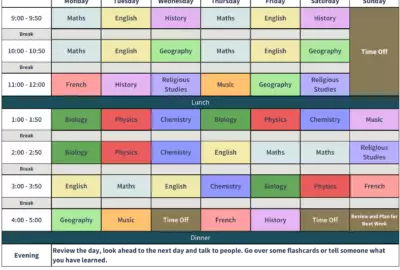Expert Insights
GCSE Options - A Comprehensive Guide on Available Subjects
Published 4th October 2024 by Alastair

GCSE Options: A Comprehensive Guide on Available Subjects
Choosing your GCSE subjects is one of the first major academic decisions you’ll make. It can feel overwhelming, but with the right guidance, you can confidently navigate the options available to you. We understand how crucial it is to make informed decisions that align with both your interests and future ambitions. In this guide, we’ll take you through everything you need to know about GCSE options, from compulsory subjects to exam boards and making the best choices for your academic journey.
GCSEs, or General Certificates of Secondary Education, are qualifications taken by students in the UK typically between the ages of 14 and 16 (Year 10 and Year 11). These subjects are studied over two years and culminate in exams at the end of Year 11. Your performance in these subjects will significantly influence your future options, such as which A-levels you can take, your university applications, or your choice of vocational training.
GCSEs are the foundation of your education, offering students the opportunity to explore a range of subjects, develop key skills, and start thinking about future career paths. Although the number of GCSEs you take may vary, selecting the right ones is important, and can make an impact on the subjects you can take when pursuing further education.
In the UK, GCSEs are assessed by different exam boards, each offering a slightly different approach to the syllabus and exams. The most common boards are:
Each exam board may assess the same subjects differently, with variations in the balance between coursework, practical assessments, and written exams. Below is an overview of the core subjects and how they are typically assessed across these exam boards.
Most students take between 9 and 10 GCSE subjects, though the total can range from 8 to 12 depending on the school and individual capabilities. Schools generally offer a combination of core and optional subjects, providing students with a broad education while allowing them to specialise in areas of interest.
Core Subjects: These are mandatory across all schools and include English, Maths, and Science. Some schools may also include additional subjects such as Welsh (for students in Wales), Citizenship, and Physical Education (PE).
Optional Subjects: Students can typically choose 4-5 additional subjects from a broad range of options, depending on their interests and career aspirations. These include subjects like History, Geography, Modern Foreign Languages (MFLs), Arts, and Technical subjects like Design & Technology.
Compulsory subjects form the foundation of your GCSE education, providing essential skills that are required in further education and most career paths. These are subjects that every student must take:
Maths: An essential skill for almost all future study and career paths.
English Language and Literature: Develops communication skills, critical thinking, and comprehension.
Science: This could be taken as separate sciences (Biology, Chemistry, Physics) or combined science.
Physical Education (PE): Though PE is mandatory, it does not necessarily require sitting an exam unless taken as an additional GCSE subject.
Welsh: For students in Wales, studying Welsh is compulsory.

Optional subjects allow students to explore their interests and develop skills in areas that may align with future career aspirations. These include a wide range of topics, from the humanities to the arts and technical subjects. Though this is not a comprehensive list, some of the most common optional GCSE subjects include:
Modern Foreign Languages: French, German, Spanish, Mandarin, Japanese.
Humanities: History, Geography, Religious Studies.
Arts: Music, Drama, Art and Design, Media Studies.
Technical Subjects: Design & Technology, Food Technology, Computer Science, Physical Education (PE), Astronomy, Business Studies.
When selecting optional subjects, consider both your interests and potential career paths. For example, if you enjoy design and are considering a career in architecture, taking Art and Design or Design & Technology may be useful.
Selecting optional GCSE subjects is an important decision that could shape your future academic and career opportunities. If you’re unsure about which subjects to choose or need extra support, our expert GCSE tuition can help you make informed decisions and excel in your chosen subjects.
Get personalised tuition with Ivy Education today!
English is usually split into two separate GCSEs: English Language and English Literature. Both are compulsory and provide vital communication skills needed in further education and careers.
AQA:
English Language: Two written papers focusing on reading comprehension, creative writing, and the analysis of unseen texts. It also includes a non-exam assessment of spoken language skills.
English Literature: Two exams covering key texts such as Shakespeare, 19th-century novels, modern drama, and poetry. There is a focus on essay-based responses to literature.
Edexcel (Pearson):
English Language: Two exams focused on non-fiction and fiction reading, with descriptive and narrative writing tasks. There is also a spoken language assessment.
English Literature: Two exams covering Shakespeare, post-1914 literature, a 19th-century novel, and poetry (both anthology and unseen).
OCR:
English Language: Two exam papers featuring non-fiction and creative writing tasks, with additional emphasis on language analysis.
English Literature: Two exams, focusing on Shakespeare, 19th-century texts, modern texts, and poetry.
Eduqas/WJEC:
English Language: Two papers assessing narrative writing, analysis of unseen texts, and transactional writing (letters, speeches). Includes a spoken language component.
English Literature: Two papers examining modern texts, Shakespeare, a 19th-century novel, and poetry.

GCSE Maths is one of the most important subjects, and all students are required to take it. It’s assessed at two levels: Foundation (grades 1–5) and Higher (grades 4–9).
AQA: Three papers: one non-calculator and two calculator papers. Topics include number operations, algebra, geometry, probability, statistics, and ratios.
Edexcel (Pearson): Assessed across three papers, similar to AQA, with one non-calculator paper and two calculator papers. The syllabus includes geometry, algebra, and statistics, with a focus on problem-solving.
OCR: Three papers (one non-calculator). The focus is on number theory, algebra, geometry, and data handling, with an emphasis on real-world applications and functional maths skills.
Eduqas/WJEC: Three papers: one without a calculator, two with. Topics covered include statistics, probability, number theory, and algebra. There is a strong focus on applying maths to everyday situations.
Students can either take Combined Science (which awards two GCSEs) or Triple Science (separate GCSEs in Biology, Chemistry, and Physics). Here’s how each subject is assessed across exam boards.
AQA:
Biology: Two exams covering topics such as cell biology, ecosystems, and genetics.
Chemistry: Two papers assessing atomic structure, chemical reactions, and organic chemistry.
Physics: Two papers on energy, electricity, particle model of matter, and space physics.
Combined Science: Six papers (two each for Biology, Chemistry, and Physics) covering a broader range of topics.
Edexcel (Pearson):
Biology: Two exams covering topics like cells, genetics, and ecosystems.
Chemistry: Two papers on topics including bonding, reactions, and the periodic table.
Physics: Two exams assessing mechanics, electricity, waves, and astrophysics.
Combined Science: Six exams, covering the main themes across Biology, Chemistry, and Physics.
OCR:
Biology: Two papers that include questions on living organisms, ecosystems, and genetics.
Chemistry: Two exams covering atomic structure, the periodic table, and environmental chemistry.
Physics: Two papers on topics such as energy, forces, waves, and space physics.
Combined Science: Six exams, covering the basics of all three sciences.
Eduqas/WJEC:
Biology: Two papers examining topics such as respiration, genetics, and ecosystems.
Chemistry: Two exams covering chemical bonding, reactions, and environmental chemistry.
Physics: Two exams on energy, forces, nuclear physics, and space.
Combined Science: Six exams, each focusing on a different aspect of Biology, Chemistry, and Physics.
Consider Your Interests and Strengths
Choose subjects that you enjoy and excel in. Passion for a subject often leads to better performance and reduces the pressure that comes with study. For example, if you have an interest in analysing events from the past, History may be a perfect option.
Think About Future Career Plans
If you already have a clear idea of your future career, select subjects that will help you on that path. For instance, if you’re considering medicine, it’s essential to take separate sciences like Biology, Chemistry, and Physics.
If you’re unsure about your future, selecting a broad range of subjects will keep your options open for both academic and career opportunities.
Don’t Choose Based on Friends or Teachers
It can be tempting to select subjects that your friends are taking or that are taught by a favourite teacher. However, this is not always in your best interest. Focus on your strengths, preferences, and future goals when making decisions.
According to Government Statistics, aside from core subjects, History is the most popular subject to take after Science, Maths, and English.
We've written a guide on how to revise for GCSE History here, if you're thinking of taking it.
Below is a table that shows the list of subjects in order of popularity:
| Subject Grouping | Entries in Summer 2024 |
|---|---|
| Combined science | 926,780 |
| Mathematics | 842,595 |
| English language | 807,785 |
| English literature | 623,610 |
| History | 312,415 |
| Geography | 287,610 |
| Biology | 183,370 |
| Chemistry | 174,750 |
| Physics | 174,745 |
| French | 130,650 |
| Spanish | 129,940 |
| Computing | 93,985 |
| Other modern languages | 42,460 |
| German | 35,110 |
| Ancient languages | 11,175 |
| Total | 4,776,980 |
The number of exams you take will depend on the subjects you choose. Most subjects require 2-3 exam papers, and students typically sit for 18-25 exams across all their subjects. Subjects like Art and Design or Media Studies may have coursework or practical elements, while others, like Maths and Science, are purely exam-based.

Once you’ve chosen your GCSE subjects, you’ll spend Year 10 and 11 studying them. You will sit for your exams at the end of Year 11, and your results will impact your options for further education, including A-levels, BTECs, or apprenticeships.
If you’re looking for support to ensure you get the best possible results, our GCSE tuition offers expert guidance tailored to your individual needs. Get started with a free consultation today!
For additional guidance on GCSE revision timetables and tips on how to get all 9s in GCSEs, Ivy Education offers helpful resources to support your preparation.
For parents, it can be challenging to guide your child through this process. Here are some ways to help:
Encourage Open Dialogue: Have regular conversations about their interests and aspirations
Research Career Paths: Help them explore different career options and what GCSE subjects may be beneficial.
Offer Emotional Support: Remind them that there’s flexibility, and no choice is permanent.
For Students. if you feel that you’ve made the wrong choice, don’t panic! Many schools allow students to change their subjects early in Year 10. However, it’s essential to act quickly and speak with your teachers if you’re considering switching. Once timetables are set and coursework begins, it may be harder to change subjects. The best thing to do is be absolutely sure about your GCSE options before you choose them. Get advice from teachers, or, if you are a student, your parents.
Ivy Education offers expert educational consultancy services to assist both students and parents in making informed decisions. If you would like support choosing your GCSE options, or would like any other GCSE support, submit an enquiry, and a member of our team will get in touch with you as soon as possible.
Choosing your GCSE options is an important step in your academic journey, but it doesn’t have to be stressful. With the right support and guidance, you can select subjects that will allow you to succeed both academically and in your future career. If you need help making your GCSE choices or preparing for exams, Ivy Education’s tuition services are here to support you every step of the way.
For more resources, check out our blogs on How GCSE grades are allocated and The differences between iGCSE and GCSE.
GCSEs are qualifications taken by students aged 14-16 in the UK. They are important because they form the foundation for further education and career choices, impacting options like A-levels, university, or apprenticeships.
Most students take 9-10 GCSE subjects, but this can vary. Schools generally offer a mix of core and optional subjects.
Compulsory GCSE subjects include Maths, English Language, English Literature, and Science. In Wales, Welsh is also required.
Choose subjects based on your interests, strengths, and potential career plans. Selecting a range of subjects helps keep future options open.
If you change your mind early, many schools allow students to switch subjects in Year 10. Speak to a teacher or advisor as soon as possible.
The main GCSE exam boards are AQA, Edexcel (Pearson), OCR, Eduqas, and WJEC. Each board has slightly different syllabi and assessments.
GCSEs are assessed through exams, coursework, or practical assessments, depending on the subject and exam board.
If you don’t get the grades you need, you can resit exams or explore alternative qualifications like BTECs or apprenticeships.
GCSE results impact your eligibility for A-levels, university, and apprenticeships. They are crucial for further education and career opportunities.
Ivy Education provides expert GCSE tuition and consultancy services to help students excel and make informed academic decisions.


















